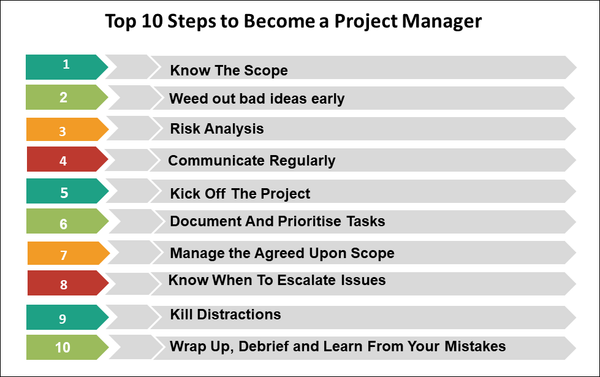How To Become A Project Manager | Career Path Guide
How to become a Project Manager
When most people think about project management, they typically envision long meetings, paperwork, supervision, delays, and stress. For someone with no project management experience, this can seem to be an overwhelmingly daunting exercise.

How to become a project manager
10 Steps to Become a Project Manager
To assist you on your project management journey, we have summarized the top ten steps you must follow to become a successful project manager below.
Step One: Know The Scope
Knowing clearly the project’s goals and objectives and knowing who you will be working with is the logical starting point of becoming a project manager. This would also be a good time to acquire as much knowledge as possible about the project and the processes involved so that you can see the project successfully to the end. Knowing the scope is one thing, but ultimately knowing as much as you can about the systems, processes, legal requirements, and any other aspect likely to occur will put you in good stead in the long run.
Check How to create a scope management template here.
Step Two: Weed out bad ideas early.
Vetting ideas at an early stage so that the bad ideas can be weeded out is a no-brainer but is easier said than done. Fortunately, there are several key questions you can ask yourself which will give you an indication of whether an idea is good to go or not:
- What is the problem you are trying to solve by undertaking this project?
- Will the project you are working on solving this problem?
- Is the project a good use of your resources?
- What would be the consequence of not completing the project?
Step Three: Risk Analysis
Risk analysis is not an exercise done at the start of the project as the market is constantly changing, and risks can arise seemingly out of nowhere.
In 2016, a survey of almost 700 project managers in the United Kingdom discovered that close to one-third of the organizations surveyed never or rarely completed a project on time, on a budget, or with the full benefits initially anticipated. Therefore, an effective project manager regularly updates their baseline as the project evolves.
To download a risk assessment template, click here.
Step Four: Communicate Regularly
By communicating with your team from the beginning of the project, you can align expectations quickly and painlessly, which helps you to avoid problems later down the road. To this end, project charters can help clarify the types of elements involved in the project.
Communication should also not be limited to just those members working directly on the project. Don’t forget to include other relevant stakeholders or interested parties in your communications and consultations. This can be done formally through weekly meetings and status reports or can be done through email updates.
Step Five: Kick Off The Project
The next step to becoming a project manager, having completed step four above, is for you to kick off the project. This will require you to accurately work out your stakeholders and involve them in a kick-off meeting. This is a great opportunity to align everyone’s expectations, as stated above and get the project to gain momentum in the right direction.
To download a project kick-off report, click here.

How to become a project manager
Step Six: Document And Priorities Tasks
Documenting tasks does not need to be a complicated or costly process. By first having a great understanding of the project, as laid on in Step One above, you will be better able to itemize your team's specific tasks and improve how your team contributes towards the end goal.
If you are unsure about the specific nature or is best suited to handle a task, becoming a Project Manager requires you to find out. Don’t be afraid to ask, research and search online for a project plan template that suits your project if necessary.
Step Seven: Manage the Agreed Upon Scope
Just because someone has come along and told you to add a task, remove another, or include a consideration that you had not originally included in your project plan does not mean you need to automatically accommodate those requests. Becoming a project manager requires you to do just that: manage. Do some research where possible to work out how this new scope will affect the end goal, meeting your deadline, and whether or not it will change the fundamental nature of the project.
Step Eight: Know When To Escalate Issues
The key thing to note here for any project manager is to keep a cool head. A problem that may seem like a major problem may, in fact, have a simple and timely solution, provided it is not escalated unnecessarily. If an issue has arisen, that is likely to put a significant dent in your project, consult the relevant members of your team and provide them with all the information necessary so that an informed decision can be made.

The skills required for successful project management can be found in our everyday lives
Step Nine: Kill Distractions
You shouldn't deviate from your list of priorities in Step Six. As the project unfolds, it is natural that something you may not have anticipated as being integral to the project has suddenly become that much more important. In that case, consult and do your research before making any impulsive decisions.
Furthermore, don’t be tempted to be interrupted in your workflow by unnecessary emails, text messages, or other mediums that can kill your productivity.
Step Ten: Wrap Up, Debrief and Learn From Your Mistakes
Don’t be in such a hurry to move on to your next project even after your current project is all but completed; now is the time to self-reflect. Are the stakeholders happy with the outcome? Did you meet your goals? What went wrong along the way?
Understanding the errors, what worked well, and what could be improved upon will enable you to become an outstanding project manager.
Likewise, if the project doesn’t work out the way you intended, you can embrace the failure as part of the learning process. As Thomas Edison once reportedly said: “I have not failed, I’ve just found 10,000 ways that won’t work.”
Conclusion:
These are just ten of the key universal steps that will enable you to become a successful project manager in your work line.
To learn more about Project Management, as well as the services we can provide to help you on your journey to success, click here.


